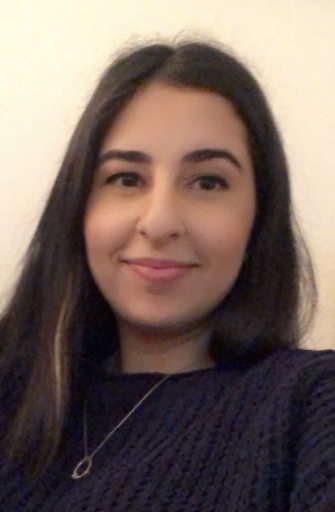
Graduate Research: Humanization of the Refugee
April 7, 2023
Ani Gazazyan (She/Her)
MA English ‘23
LinkedIn
@anigazazyan on Instagram
Ani Gazayan is a proud Armenian American who was born and raised in the San Fernando Valley in Los Angeles. She received her BA in English from California State University, Northridge and moved to Orange, CA to pursue her MA at Chapman University. She is also a Graduate Student Instructor of English 103: Rhetoric and Composition of Popular Culture. Her general research interests focus on Critical Refugee Studies and the digital representation of displaced individuals worldwide. She intends to focus her doctoral specialization on refugees of southwest Asia.
For our latest Voice of Wilkinson feature, graduate student Ani Gazayan discusses the research work that led to her thesis, and her advice for current and incoming graduates.
Voice of Wilkinson: What drove your initial interest in developing the research that would eventually lead to your thesis research?
Ani Gazayan: It was during fall 2021 that I really started thinking about and responding to many different novels and texts I was reading in my classes. Specifically, I was taking English 546: Multicultural Literature with Dr. Rei Magosaki when I resonated with the range of texts and authors we covered. In this course, we read novels focusing on race and immigration, like The Thing Around Your Neck by Chimamanda Ngozi Adichie, to a range of cultural texts like There There by Tommy Orange, which focuses on Native American identity and history. It wasn’t until we started reading novels about refugeehood, specifically Exit West by Mohsin Hamid, that I became so sure of the direction I wanted to take my thesis topic. After reading this novel, I went on to write a research paper about Hamid’s novel. I considered Edward Said’s Orientalism and the applicability of his work in the context of an ever-changing globalized world and the
limited visibility of refugees in news and media outlets in the 21st century. This paper sparked the initial general discussion and interest that developed into my current thesis.
VoW: What were some key takeaways from your research?
AG: Did you know that as of 2019, the number of international migrants and forcibly displaced individuals globally reached 272 million, or 3.3% of the world’s population? What do we come to understand from such an unfathomable number? It’s something so incomprehensible that we just accept and move on. I considered this central idea when writing my thesis titled “Humanization of the Refugee as the Modern Subject in Mohsin Hamid’s Exit West.”
Hamid’s novel perfectly represents the modern-day refugee and their endurance of living in displaced, unknown spaces around the world. His novel tells the story of two protagonists who are constantly moving from city to city in hopes of finding stability and safety. Through technology and media, Hamid provides commentary on the fleeting sense of connectedness it brings to the world because of its violent and available depictions of refugeehood and the targeting of refugee bodies. My thesis, in general, aims to represent refugees as humans. Hamid’s fictional representation of the refugee exerts empathy, compassion, and humanity in the way he passionately writes about his protagonist’s separate existences. The central takeaway from my research is to inform and shed light on Hamid’s work as a way of displaying the refugee as a human being through his use of fictional dualities, magical realism, and multimodal spaces of modernity.
VoW: What most surprised you about your research, or the thesis writing process?
AG: At first, my paper focused on the built history that revolved around the Middle East and how it has been shaped and perceived through literature. Now, my paper focuses on more than just history. It focuses on the representation of a people that have been given less than the fundamental human rights and necessities to live. Furthermore, it describes and combats the general stereotypes and assumptions created about the refugee through digital spaces. I specifically discuss this through Hamid’s novel as a general example of how he creates this relatability and connection to his readers.
My paper has changed drastically from the start of this semester. I could not have done this without the help of my Committee Chair, Dr. Rei Magosaki. She helped me reorganize and effectively state the central claims of my thesis and provided additional resources when conducting research about my topic.
VoW: What has been your best experience at Chapman?
AG: Hands down, the best experience I’ve had at Chapman has to be my position as a Graduate Student Instructor. My passion in life is to teach, and the fact that Chapman offers this opportunity to MA students is one of the most unique and amazing additions to the institution and Wilkinson’s program.
It has been a meaningful experience to teach an introductory-level stand-alone course on Rhetoric and Composition, focusing on Popular Culture. I am passionate about designing courses of my own, working with undergraduate students, and enjoyed introducing them to texts such as J. Jack Halberstam’s work Gaga Feminism and The Mark of Criminality by Bryan J. McCann. At the core of my philosophy in teaching is my commitment to helping students grow as writers and guide them to develop an interest in wide-ranging and inclusive cultural texts while applying rhetorical and critical writing skills. I can’t thank Wilkinson’s MA program enough for providing students this opportunity!
VoW: For our incoming students to the English program, what did you wish you had known starting your MA? What did you appreciate about the program? Is there a takeaway that still serves you in your day-to-day endeavors?
AG: Starting my MA felt very intimidating initially because I felt I wasn’t smart enough to be a part of such a prestigious institution. That all changed when I started to interact with the instructors of Wilkinson College because they are very compassionate and willing to do everything they can to help you succeed. Chapman provided many unique opportunities to help me build my resume and educate myself about the specific fields I wanted to study. I appreciated every single one of my professors who took the time to sit and discuss my work with me one-on-one and help me grow as a writer.
The best advice I can give anyone coming into this MA program is that no matter where you come from or who you are, you are intelligent enough to be here at Chapman. You have achieved greatness already by being a part of this program, and you will succeed and experience so much every single semester. I’ve learned so much more in the three years of being a part of this program than I have in my undergraduate career. So, set your mind to the goals you want to achieve, plan ahead, reach out to the professors that specialize in the area that interests you most, work with them every semester, and write with passion.
To close off this interview, I want to add one of my favorite quotes that hopefully motivates you and drives you to succeed here at Chapman: “What you do makes a difference, and you have to decide what kind of difference you want to make” (Jane Goodall).



